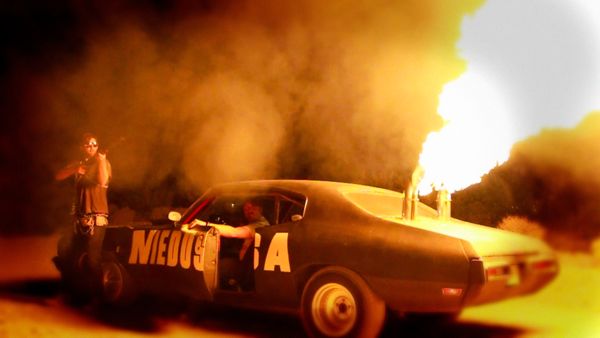Culture
A flower in the wastelands

Bellflower
dir. Evan Glodell
Release Date: Sep 16, 11
- 1
- 2
- 3
- 4
- 5
- 6
- 7
- 8
- 9
- 10
A bearded man covered in blood. A roaring muscle car with “Medusa” printed on the side. A box marked “Milly’s Shit.” These are the fragmented images that begin Bellflower, a violent, surreal take on the twentysomethings-talk-about-life subgenre. If you can picture Slacker-era Richard Linklater getting really into scorched-Earth apocalypse movies (Mad Max hovers over every moment of this film, both in name and in aesthetic), you have a good idea of exactly what writer-director-star Evan Glodell and company are getting at.
Woodrow (Glodell) and Aiden (Tyler Dawson) are the iconographic face of an entire generation of angry young men, raised on a steady diet of apocalyptic fantasies, girl-you-can’t-have rock songs and alcohol. That last one cannot be overemphasized; these are young men content to pass their time pounding 40s, smoking pot and building flamethrowers and muscle cars to prepare for the day when they can lord over the wastelands. In the meantime, they spend every night belligerently drunk, hanging out and attempting to meet women. There’s a seriocomic, ground-level reality to these early scenes. Though most of the performances suffer very slightly from their delivery by mostly untrained actors, Bellflower feels so lived-in that it doesn’t really matter.
One night, Woodrow encounters Milly (Jessie Wiseman), an attractive and caustic moll, who condemns Woodrow to doom the minute she explains, in the middle of a three-day first date, that he doesn’t want her as a girlfriend because “I’ll hurt you, and I won’t be able to help it.” To men like Woodrow, that’s a challenge more than a warning, and his insistence on making an honest woman of her leads to a series of increasingly dark turns that take the idea of a personal romantic apocalypse as literally as it can possibly go.
The film lives and dies by its final third, in which Woodrow becomes increasingly volatile after a major tragedy, leading to a series of violent episodes that may be hallucinatory or real. Unlike, say, Black Swan, in which the mystery is what’s real (and what isn’t), Bellflower has no desire to answer that question, instead using Woodrow’s unreliable point of view to attack the narcissism, sexism and simmering violence of a quarterlife crisis. There are moments that are in theory grossly offensive here, particularly in the film’s general treatment of Milly as a whole, but taking the film as an attack on self-destruction, one can’t help but wonder how much of Milly is real and how much is based around Woodrow’s construction of the world around him.
At turns hallucinatory, hilarious, brutal and brutally poignant, Bellflower is a film that, upon a single viewing, feels destined for cult immortality. There’s an indelible image about halfway in, when Woodrow and Aiden complete their flamethrower and stand about, firing it into the night sky, in which the real heart of the film emerges: This is a story of male bonding and broken hearts, and how in such cases firing off weapons into the night sky, with no intentions of a future, are the only means of coping. Bellflower isn’t perfect, but this is an original work that will rattle you to the core.